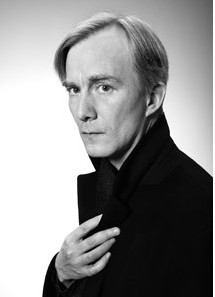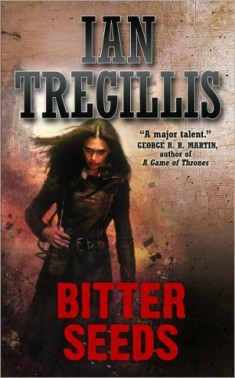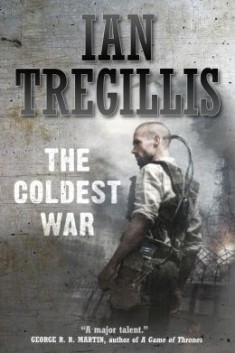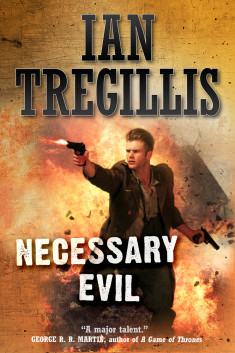Ian Tregillis is the author of the Milkweed Triptych and his new novel, Something More Than Night just came out, to rave reviews. He’s also an all around nice guy and was kind enough to answer a few of my questions about the new book, and more (including a new series-squeeee)! Please welcome him to the blog!
 Your brand new novel, Something More Than Night, a noir-tinged murder mystery starring fallen angels, is a bit of a departure from your other books, and sounds wonderful! Will you tell us a bit about it and what inspired you to write it?
Your brand new novel, Something More Than Night, a noir-tinged murder mystery starring fallen angels, is a bit of a departure from your other books, and sounds wonderful! Will you tell us a bit about it and what inspired you to write it?
Well, first, thank you very much for the kind words. The seed idea was something that had been rattling around in the back of my mind for many years — since long before I became a writer. It just happened that while I was writing my previous series, the Milkweed books, my daydreaming kept coming back to this idea of a novel set in Heaven. As time went on, I got more and more excited about it, and eventually decided that the untitled “novel-thing-set-in-something-like-Heaven” would be a fun way to reward myself after I finished the Milkweed books. Sort of a standalone palate cleanser before diving into the work on another series.
I’m a big believer in writing against obstacles, and using challenges to stretch myself. So at some point during that daydreaming I decided a fun challenge would be to have one of the characters speak like a somebody in a 1930s noir detective novel. That idea came almost out of nowhere, but it gave the brainstorming just the right random kick to make the whole thing crystallize. So it turned into a noir-inspired murder mystery set in Heaven. (I often find that my favorite projects are the ones that combine two or three seemingly unrelated ideas in weird combinations. Or begin like that.)
 You have a doctorate in physics, but have you always been interested in being an author? What inspired you to begin writing fiction?
You have a doctorate in physics, but have you always been interested in being an author? What inspired you to begin writing fiction?
I have always been interested in writing (I suppose most writers say that). I tried writing stories for myself when I was very little. I think my first attempted novel, “Space Raders” [sic], grew to an epic 6 or 7 pages before I succumbed to writer’s block. Or possibly it was bed time. When I was older, I took creative writing classes in high school and college, when I could fit them in, and found I enjoyed them quite a bit. But writing was always something that I wanted to pursue “some day.” I wasn’t smart enough to realize that writing is something you have to make time for, rather than waiting for the opportunity to present itself.
So it wasn’t until I finished graduate school, and moved 1000 miles away from my friends and family, that I felt like I could finally devote serious time to trying to learn how to write. At some point I had come across the Online Writing Workshop for Science Fiction, Fantasy, and Horror (the good old OWW), but hadn’t joined while I was still in school. (I felt that I would never graduate if I allowed myself to indulge too many outside interests before I graduated. I’m a slow thinker and I don’t multitask well.) So once I moved from Minnesota to New Mexico, I picked up a few books of writing advice and joined the OWW. And promised myself that I’d be humble and take as long as I needed to start learning the craft. I saw it as a very long-term project.
What kind of research did you do for Something More Than Night?
Once I decided that parts of the dialogue should embrace noir tropes, I knew I had to devote time to reading the classic noir authors: Dashiell Hammett, Raymond Chandler, James M. Cain, etc. I tried to read their work on several levels. First and foremost, I tried to extract as much of that delicious noir vocabulary and terminology that I could. I ended up assembling a slang glossary for myself that ran to about 80 pages. I also tried to get a sense of the tropes of the genre: how are these stories structured, what is the role of the protagonist, what kinds of environments do they navigate, how do they relate to their surroundings, etc.
It started out purely as an assignment for myself. But I quickly discovered that I genuinely enjoy the Marlowe novels (for all their faults in places, I think Chandler was one of the great American writers), and Hammett’s _The Thin Man_ is one of my favorite books. It’s laugh-aloud funny in many places; a really witty book.
One unexpected benefit of this reading was the discovery that it’s fairly straightforward to plot out a noir pastiche. There are certain things that happen frequently enough in these novels so as to almost be de rigueur: the detective finds a dead body, the detective gets grilled by the bulls, the detective gets sapped or slipped a mickey… So once I started to get a sense of the rules of the genre, the fun for me was looking for ways to play with those expectations and subvert them. Not sure how well I succeeded, but it was a hell of a lot of fun.
 Will you tell us more about your fallen angel, Bayliss, and what you enjoyed most about writing his character?
Will you tell us more about your fallen angel, Bayliss, and what you enjoyed most about writing his character?
Bayliss was a very fun character to write. He’s stuck living on Earth, for complicated reasons, and for other complicated reasons he has decided to adopt the persona of a bargain-basement Philip Marlowe. I knew very early on that I could never emulate the brilliant prose of Raymond Chandler, so instead I tried to give Bayliss his own voice while infusing the dialogue with little homages to the master.
Early in the writing of the novel, the Bayliss scenes were slow going because I had to familiarize myself with the slang as well as his way of seeing the world. But eventually I got the hang of him, and then the Bayliss scenes became the easier of the two point of view sequences to write. In fact, by the end of the book, I had to pare down the Bayliss stuff because I was almost having too much fun with it.
My take on the noir detective is that when you hire Philip Marlowe, or Sam Spade, or Lew Archer, you’re really paying for that character’s knowledge of a world that’s hidden or unfamiliar to you. (Unless, of course, you’ve already got some dirt on your neck…) By hiring the shamus, you’re hiring a guide to that hidden world, paying for access to his knowledge of how to navigate that world and interact with its denizens.
At some point I realized that if this is the case, a noir detective and a psychopomp really aren’t all that different.
So Bayliss was intended to fulfill that role both literally and figuratively. He’s forced into the role of a detective, yes, but he’s also the recently deceased Molly Pruett’s guide to Heaven in a more literal sense. (Or, as the angels call it, the Pleroma.) By investigating the mystery that drives the novel, Molly learns more and more about the rules of a world that was until recently entirely hidden to her. It’s the same formula, just in this case Bayliss is teaching her (and us) about the metaphysical and ontological substrates that underlie the mortal world. And I suppose one could argue that some noir settings make a case for the criminal world, the world where everybody is gray and nobody’s hands are clean, as the inseparable substrate to lawful, ordered society.
 What is your writing process like? Are you a plotter or a pantser?
What is your writing process like? Are you a plotter or a pantser?
I am a dedicated outliner. The thought of pantsing an entire novel scares me witless. There are writers who do that to fantastic success, but I don’t trust my subconscious enough to give it that much rope.
In order to write I need to know before I start, at bare minimum, the beginning and end. That’s sometimes enough for a short story. For a novel, I start there, and then break the book into acts, and figure out the beginning and end of each act. And then I break each act into chapters, and I work out the starting and ending points of each of those. And then I break the chapters into scenes. Once I have a scene-by-scene outline, or at least a scene outline for the first few chapters of a book, with broader strokes worked out for the rest, I feel comfortable going forward.
Often the outline undergoes a lot of revision as I write my way through it. Sometimes the outline for the upcoming scenes gets changed, but often also it’s the scenes I’ve already written that undergo revision.
I often tell people I’m a better rewriter than writer. Even after all that outlining, that front-loaded effort doesn’t lead to a perfect novel. (As if such a thing existed.) It does give me a solid first draft, though, which is a springboard for an end-to-end rewrite, and which often can be fairly comprehensive.
What authors or novels have influenced you the most in your writing, and in life?
I have been incredibly fortunate to have benefited from the kindness and tutelage of quite a few writers. A number of great writers like Elizabeth Bear and Charles Coleman Finlay took me under their wings when I was a brand-new aspiring writer on the Online Writing Workshop. (Charlie was also one of my instructors at Clarion a few years later.) I’m also very fortunate to live in northern New Mexico, where there happens to be a very high concentration of professional science fiction and fantasy writers. So after Clarion I fell in with a group that includes Walter Jon Williams, Melinda Snodgrass, Daniel Abraham, S. M. Stirling, and that George Martin guy. I’m particularly indebted to Walter, in fact, because he was another Clarion instructor, and it was he who realized I was living in the midst of that group.
In terms of writers whose work has influenced me, I’m a great admirer of Roger Zelazny, Tim Powers, and Elizabeth Wein. Oh, and of course the great Raymond Chandler. I’ll never be able to write like these authors, but I have tried to study their work in order to improve my own.
What are you reading now?
The book sitting on the table next to the laptop as I write this is SNUFF by Terry Pratchett. (I think it’s number 39 in the Discworld series.) I’ve been reading the Discworld books for probably 25 years, and I always keep 1 or 2 unread volumes on my bookshelf so that I always have something to look forward to no matter what’s happening in my life. After I finish this, I’m moving on to A DANCE WITH DRAGONS (finally), THE REPUBLIC OF THIEVES, and ROSE UNDER FIRE, which is the follow-up to Elizabeth Wein’s tour-de-force novel CODE NAME VERITY.
 What piece of advice would you give to aspiring authors?
What piece of advice would you give to aspiring authors?
The most important thing for a writer to do is write. It’s not enough to want to be a writer if you don’t put the time and effort in. Everybody’s process is different, and there’s no right or wrong way to go about it — part of becoming a writer is figuring out how you work and how to facilitate that. All that matters is that words get committed to paper. Every sentence you write is excellent practice for the next sentence.
And try to find ways to keep it fun for yourself. Writing is hard work and if it starts to feel like an dreaded obligation, rather than a passion, it can become even more difficult.
When you’re not working on your next project, how do you like to spend your free time?
Like many writers, I’m a working stiff with a full-time day job, so the writing is confined to evenings and weekends. Which means I don’t have a tremendous amount of free time, unfortunately. But in addition to reading (aren’t all writers inveterate readers?) I like to hike, bicycle, ski, and spend time with my fiancée — I recently got engaged to a wonderful woman whom I’ve known for over 23 years.
What’s next for you?
I’m currently writing a short story for a Kickstarter-funded anthology called Clockwork Universe, and I continue to participate in the Wild Cards shared-world anthology series. I’m also trying to squeeze out time to write a short story set in the world of SOMETHING MORE THAN NIGHT, starring Bayliss.
But my main project, though, and the focus of most of my writing time, is a clockpunk fantasy alt-history series tentatively titled The Clakkers Trilogy, which I’m writing for Orbit US/UK. I submitted the first of those books this fall, and now I’m hard at work on the second volume. So this will keep me busy through 2015.
Keep up with Ian: Website | Twitter
About SOMETHING MORE THAN NIGHT:
Ian Tregillis’s Something More Than Night is a Dashiell Hammett and Raymond Chandler inspired murder mystery set in Thomas Aquinas’s vision of Heaven. It’s a noir detective story starring fallen angels, the heavenly choir, nightclub stigmatics, a priest with a dirty secret, a femme fatale, and the Voice of God.Somebody has murdered the angel Gabriel. Worse, the Jericho Trumpet has gone missing, putting Heaven on the brink of a truly cosmic crisis. But the twisty plot that unfolds from the murder investigation leads to something much bigger: a con job one billion years in the making.
Because this is no mere murder. A small band of angels has decided to break out of heaven, but they need a human patsy to make their plan work.
Much of the story is told from the point of view of Bayliss, a cynical fallen angel who has modeled himself on Philip Marlowe. The yarn he spins follows the progression of a Marlowe novel—the mysterious dame who needs his help, getting grilled by the bulls, finding a stiff, getting slipped a mickey.
Angels and gunsels, dames with eyes like fire, and a grand maguffin, Something More Than Night is a murder mystery for the cosmos.




Excellent interview! (sorry I’m just finding it now). I only recently discovered Tregillis from reading Bitter Seeds, and that book just blew me away. Nice to see There’s plenty more Tregillis books just waiting for me to pick them up!